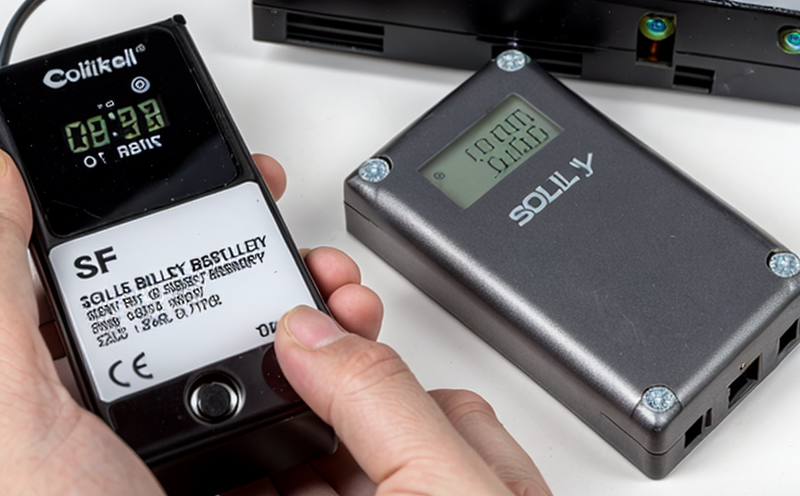DIN EN 62133-2 Solid-State Battery Testing for Portable Rechargeable Applications
The DIN EN 62133 series of standards provides a comprehensive framework for the testing, certification, and labeling of rechargeable batteries intended for portable applications. Among these standards, DIN EN 62133-2 specifically addresses the safety requirements for solid-state batteries used in such applications.
Solid-state batteries are a significant advancement in battery technology, offering enhanced safety, higher energy density, and longer operational life compared to traditional lithium-ion batteries. This standard is crucial because it ensures that these advanced batteries meet stringent safety criteria before being deployed in portable devices like smartphones, laptops, and wearables.
The testing protocol outlined in DIN EN 62133-2 covers a wide range of safety tests designed to evaluate the mechanical, electrical, thermal, and chemical stability of solid-state batteries. These tests are essential for ensuring that the batteries can withstand various stressors without compromising their integrity or posing a risk to users.
The standard specifies detailed procedures for specimen preparation, including the selection of appropriate materials and dimensions that reflect real-world usage conditions. The testing apparatus used in this process includes specialized equipment capable of simulating environmental stresses such as high temperature, vibration, and overcharging.
One key aspect of DIN EN 62133-2 is its focus on preventing thermal runaway, a phenomenon where the battery's internal temperature rises uncontrollably. The standard mandates rigorous testing to ensure that solid-state batteries can self-regulate during such incidents, thereby minimizing hazards associated with overheating.
In addition to safety considerations, this standard also addresses performance metrics like capacity retention and charge/discharge efficiency under various operating conditions. These parameters are critical for manufacturers aiming to optimize the user experience of portable devices powered by these advanced batteries.
The testing process outlined in DIN EN 62133-2 is designed to be robust yet flexible, allowing manufacturers to adapt tests based on specific product characteristics and intended use cases. This flexibility ensures that all batteries comply with stringent safety standards while also meeting the diverse needs of modern portable electronics.
For quality managers, compliance officers, R&D engineers, and procurement teams involved in the development and certification of solid-state batteries, understanding this standard is crucial. It provides a clear roadmap for ensuring that products meet international safety regulations before reaching market shelves.
Eurolab Advantages
At Eurolab, we pride ourselves on offering comprehensive testing services tailored to meet the highest standards in various sectors, including electronics and renewable energy. When it comes to solid-state battery testing under DIN EN 62133-2, our expertise and commitment set us apart:
- Expertise: Our team of engineers and technicians is well-versed in the latest methodologies and techniques required for DIN EN 62133-2 compliance.
- State-of-the-art facilities: We have access to cutting-edge testing equipment capable of simulating real-world environmental stresses on solid-state batteries.
- Comprehensive reports: Our detailed test reports provide not only results but also insights into potential areas for improvement, helping clients optimize their products further.
- Rapid turnaround times: We understand the importance of timely delivery and strive to complete tests within agreed-upon timelines without compromising on quality.
- Cost-effective solutions: By offering competitive pricing alongside high-quality testing services, we ensure that our clients receive excellent value for their investment.
- Client support: Our dedicated customer service team is always available to assist with any queries or concerns regarding the testing process.
We are committed to supporting our clients throughout every stage of product development and certification, ensuring they have the necessary tools and knowledge to succeed in today's competitive market.
Why Choose This Test
Selecting DIN EN 62133-2 solid-state battery testing is a wise decision for several reasons:
- Achieve compliance: Ensuring your product meets all relevant international standards is essential for accessing global markets.
- Enhance safety: By adhering to these stringent tests, you protect users from potential risks associated with battery failures or malfunctions.
- Increase market credibility: Compliance with recognized international standards enhances consumer trust and confidence in your brand.
- Optimize performance: The insights gained from thorough testing can help refine product design, leading to improved efficiency and longevity.
- Avoid costly recalls: Early identification of potential issues through rigorous testing helps prevent costly post-launch corrections.
- Stay ahead of trends: As solid-state batteries continue to gain popularity, being at the forefront of this technology ensures competitive advantage.
- Accelerate development cycles: With clear guidelines provided by DIN EN 62133-2, manufacturers can streamline their testing processes and accelerate time-to-market.
In summary, choosing DIN EN 62133-2 solid-state battery testing not only ensures compliance but also contributes significantly to product safety, market acceptance, and overall success in the industry.
Quality and Reliability Assurance
The quality and reliability of solid-state batteries are paramount for their widespread adoption across various sectors. At Eurolab, we take a multi-faceted approach to ensure that our testing services contribute effectively to maintaining these standards:
- Stringent adherence: We strictly follow all procedures outlined in DIN EN 62133-2 without deviation.
- Data accuracy: Our sophisticated instrumentation ensures precise measurements and accurate data collection.
- Consistent results: By maintaining consistent testing protocols, we provide reliable data that can be trusted for decision-making purposes.
- Continuous improvement: We continuously review our processes to incorporate new technologies and methodologies that enhance test accuracy further.
- Training and certification: Our staff undergo regular training programs to stay updated on the latest developments in solid-state battery technology.
- Regular audits: Internal and external audits ensure compliance with best practices and regulatory requirements.
Through these measures, we guarantee that our testing services contribute significantly to enhancing the quality and reliability of solid-state batteries used across various applications.





